



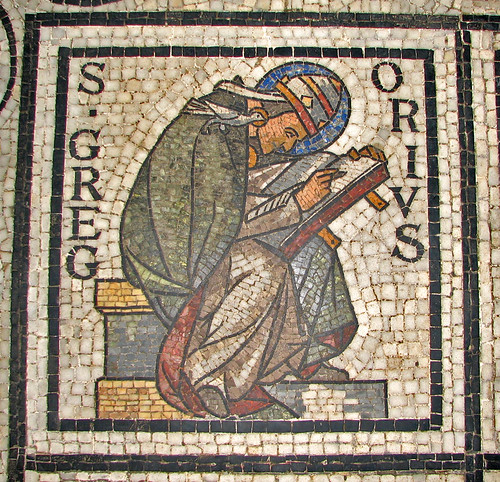 Some people think that I'm not "nice" because I hold vowed officers of the church to the faith handed down by the apostles. Well, on this March 12, commemoration of Gregory the Great, Doctor of the Church and Bishop of Rome, I'm going to try to be more gregarious. . . or at least Gregorian.
Some people think that I'm not "nice" because I hold vowed officers of the church to the faith handed down by the apostles. Well, on this March 12, commemoration of Gregory the Great, Doctor of the Church and Bishop of Rome, I'm going to try to be more gregarious. . . or at least Gregorian.Gregory was born around 540, of a politically influential family, and in 573 he became Prefect of Rome; but shortly afterwards he resigned his office and began to live as a monk. In 579 he was made apocrisiarius (representative of the Pope to the Patriarch of Constantinople). Shortly after his return home, the Pope died of the plague, and in 590 Gregory was elected Pope.
Like Leo before him, he became practical governor of central Italy, because the job needed to be done and there was no one else to do it. When the Lombards invaded, he organized the defense of Rome against them, and the eventual signing of a treaty with them. When there was a shortage of food, he organized the importation and distribution of grain from Sicily.
 His influence on the forms of public worship throughout Western Europe was enormous. He founded a school for the training of church musicians, and Gregorian chant (plainchant) is named for him. The schedule of Scripture readings for the various Sundays of the year, and the accompanying prayers (many of them written by him - and still sung!), in use throughout most of Western Christendom for the next thirteen centuries, is largely due to his passion for organization. His treatise, On Pastoral Care, while not a work of creative imagination, shows a dedication to duty, and an understanding of what is required of a minister in charge of a Christian congregation.
His influence on the forms of public worship throughout Western Europe was enormous. He founded a school for the training of church musicians, and Gregorian chant (plainchant) is named for him. The schedule of Scripture readings for the various Sundays of the year, and the accompanying prayers (many of them written by him - and still sung!), in use throughout most of Western Christendom for the next thirteen centuries, is largely due to his passion for organization. His treatise, On Pastoral Care, while not a work of creative imagination, shows a dedication to duty, and an understanding of what is required of a minister in charge of a Christian congregation.
Doctrinally speaking, there is little of great interest. He is known to have defended the physical resurrection from a subtle attack by no less than the Patriarch of Constantinople himself! Eutychius speculated on our resurrection bodies being "more subtle than air" but there is a record of his having recanted before death. (Hey...maybe I'm gregorious in dealing with my own Eutychius after all! With him, I say Pro cuius amore in eius eloquio nec mihi parco - "For the love of whom (God) I do not spare myself from his Word.") Gregory's letters and sermons are still readable today, and it is not without reason that he is accounted (along with Ambrose, Jerome, and Augustine of Hippo) as one of the Four Latin Doctors (=Teachers) of the ancient Church. (Athanasius, Gregory of Nazianzen, Basil the Great, and John Chrysostom are the Four Greek Doctors.)
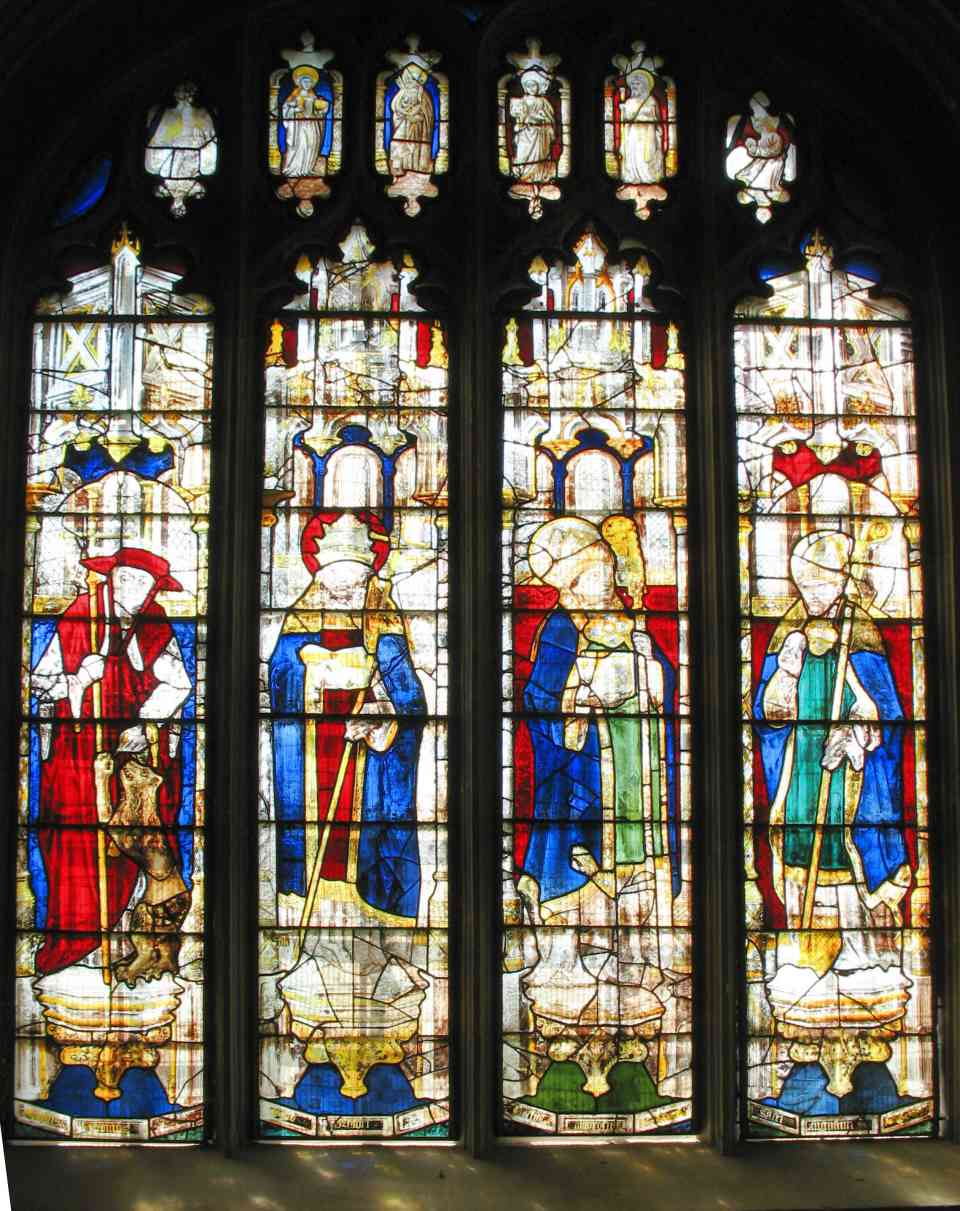
English-speaking Christians will remember Gregory for sending a party of missionaries headed by Augustine of Canterbury (not to be confused with the more famous Augustine of Hippo) to preach the Gospel to the pagan Anglo-Saxon tribes that had invaded England and largely conquered or displaced the Celtic Christians previously living there. He was moved when he saw some fair-haired, blue-eyed Angle boys being sold in a slave market and quipped: "Non Angli, sed Angeli!" (they are not Angles, but Angels!) Gregory had originally hoped to go to England as a missionary himself, but was pressed into service elsewhere, first as apocrisiarius and then as bishop of Rome. He accordingly sent others, but took an active interest in their work, writing numerous letters both to Augustine and his monks and to their English converts.

I here mention something that was not Gregory's doing, but is an important part of Church history. It was in Gregory's lifetime that Rome, and with it the Western Empire, with astonishing suddenness, and for no reason that I know of, went monolingual. For more than six centuries previously, Greek had been spoken at Rome along with Latin. Every Roman with pretensions to being educated could speak it. Everyone involved in shipping and commerce, from banker to stevedore, could speak it. The list of the early Bishops of Rome has a fair proportion of Greek names. When Paul wrote an epistle to the Romans, he wrote in Greek as a matter of course. But in Gregory's lifetime this changed. Gregory was ambassador to the Eastern Patriarch at Constantinople for six years, but he never bothered to learn Greek. And in his day (not, as far as I have any reason to believe, as a result of his example or influence) most other Latin-speakers did not trouble to learn Greek either. The already existing difficulties of communication between Latin and Greek theologians were greatly exacerbated by this development. Increasingly, Latins did not read the commentaries and other writings of Greek Christians, and vice versa. Thus differences between the two that dialogue might have resolved were left to accumulate, culminating in the formal split between Latin and Greek Christendom in 1054.
If I were to select a ground on which this devout Christian of great accomplishments might reasonably be censured, it would be that his Dialogues, a book on the Lives of the Saints, is full of accounts of dreams and visions that various persons were said to have had of souls in Purgatory. Gregory, a man of keen critical judgment on many matters, was completely uncritical in his acceptance of these stories. A general belief in Purgatory was standard among Christians when he wrote; but his reliance on "ghost stories" to fill in the imaginative details gave the doctrine as held thereafter in Latin Christendom both a prominence and a coloring that it had not previously had, with results that many Christians, including adherents of the Pope, have found regrettable - and a constant impediment to church union.
Almighty and merciful God, who didst raise up Gregory of Rome to Be a servant of the servants of God, and didst inspire him to send missionaries to preach the Gospel to the English people: Preserve in thy Church the catholic and apostolic faith they taught, that thy people, being fruitful in every good work, may receive the crown of glory that fadeth not away; through Jesus Christ our Lord, who liveth and reigneth with thee and the Holy Spirit, one God, for ever and ever.
Almighty and merciful God, who raised up Gregory of Rome to Be a servant of the servants of God, and inspired him to send missionaries to preach the Gospel to the English people: Preserve in your Church the catholic and apostolic faith they taught, that your people, being fruitful in every good work, may receive the crown of glory that never fades away; through Jesus Christ our Lord, who lives and reigns with you and the Holy Spirit, one God, for ever and ever.
 I'm catching some flack from a numpty (not this numpty, but one of his devotees) about my having switched teams (left the PCUSA and joined the Anglican Communion). He's very upset that I "have decided to renounce not only the Constitution of the Presbyterian Church, but the presbyterian form of government itself in favor of the papacy" and "ditching Westminster and the presbyterian form of church government."
I'm catching some flack from a numpty (not this numpty, but one of his devotees) about my having switched teams (left the PCUSA and joined the Anglican Communion). He's very upset that I "have decided to renounce not only the Constitution of the Presbyterian Church, but the presbyterian form of government itself in favor of the papacy" and "ditching Westminster and the presbyterian form of church government." An excellent study of the many issues involved in church polity - from biblical, theological, historical, and practical perspectives - is given in a book called Who Runs the Church. Therein, representatives of episcopal, presbyterian, and congregational systems give their side and graciously critique the positions of the others. I'll let you decide who wins....
An excellent study of the many issues involved in church polity - from biblical, theological, historical, and practical perspectives - is given in a book called Who Runs the Church. Therein, representatives of episcopal, presbyterian, and congregational systems give their side and graciously critique the positions of the others. I'll let you decide who wins.... For what it's worth, I'm an Anglican because I think that it has the greatest chance of bringing about catholic unity - not by bridging the divide between Rome and the Protestants, but by reuniting every Christian Church with the past and the present (including the Eastern churches) in practice and polity, as well as in barebones orthodoxy (via the Nicene Creed) - without the dogmatism on developments after the first ecumenical councils. And I'm proud to stand next to defenders of the faith like these guys.
For what it's worth, I'm an Anglican because I think that it has the greatest chance of bringing about catholic unity - not by bridging the divide between Rome and the Protestants, but by reuniting every Christian Church with the past and the present (including the Eastern churches) in practice and polity, as well as in barebones orthodoxy (via the Nicene Creed) - without the dogmatism on developments after the first ecumenical councils. And I'm proud to stand next to defenders of the faith like these guys.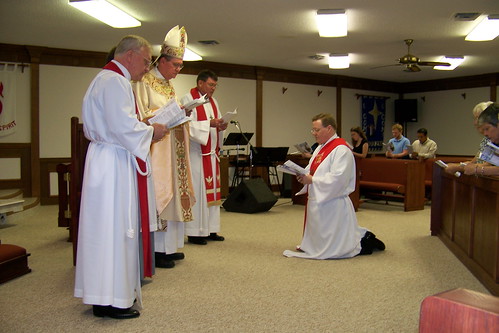 Bishop My brother, the Church is the family of God, the body of Christ, and the temple of the Holy Spirit. All baptized people are called to make Christ known as Savior and Lord, and to share in the renewing of his world. Now you are called to work as a pastor, priest, and teacher, together with your bishop and fellow presbyters, and to take your share in the councils of the Church. As a priest, it will be your task to proclaim by word and Deed the Gospel of Jesus Christ, and to fashion your life in accordance with its precepts. You are to love and serve the people among whom you work, caring alike for young and old, strong and weak, rich and poor. You are to preach, to declare God's forgiveness to penitent sinners, to pronounce God's blessing, to share in the administration of Holy Baptism and in the celebration of the mysteries of Christ's Body and Blood, and to perform the other ministrations entrusted to you. In all that you do, you are to nourish Christ's people from the riches of his grace, and strengthen them to glorify God in this life and in the life to come.
Bishop My brother, the Church is the family of God, the body of Christ, and the temple of the Holy Spirit. All baptized people are called to make Christ known as Savior and Lord, and to share in the renewing of his world. Now you are called to work as a pastor, priest, and teacher, together with your bishop and fellow presbyters, and to take your share in the councils of the Church. As a priest, it will be your task to proclaim by word and Deed the Gospel of Jesus Christ, and to fashion your life in accordance with its precepts. You are to love and serve the people among whom you work, caring alike for young and old, strong and weak, rich and poor. You are to preach, to declare God's forgiveness to penitent sinners, to pronounce God's blessing, to share in the administration of Holy Baptism and in the celebration of the mysteries of Christ's Body and Blood, and to perform the other ministrations entrusted to you. In all that you do, you are to nourish Christ's people from the riches of his grace, and strengthen them to glorify God in this life and in the life to come.
Bishop My brother, do you believe that you are truly called by God and his Church to this priesthood?
Ordinand I believe I am so called.
Ordinand I do.
Bishop Will you respect and be guided by the pastoral direction and leadership of your bishop?
Ordinand I will.
Bishop: Will you be diligent in the reading and study of the Holy Scriptures, and in seeking the knowledge of such things as may make you a stronger and more able minister of Christ?
Ordinand I will.
Bishop Will you endeavor so to minister the Word of God and the sacraments of the New Covenant,that the reconciling love of Christ may be known and received?
Ordinand I will.
Bishop Will you undertake to be a faithful pastor to all whom you are called to serve, laboring together with them and with your fellow ministers to build up the family of God?
Ordinand I will.
Bishop Will you do your best to pattern your life and that of your family, or in accordance with the teachings of Christ, so that you may be a wholesome example to your people?
Ordinand I will.
Bishop Will you persevere in prayer, both in public and in private, asking God's grace, both for yourself and for others, offering all your labors to God, through the mediation of Jesus Christ, and in the sanctificationof the Holy Spirit?
Ordinand I will.
Bishop May the Lord who has given you the will to do these things give you the grace and power to perform them.
Ordinand Amen.
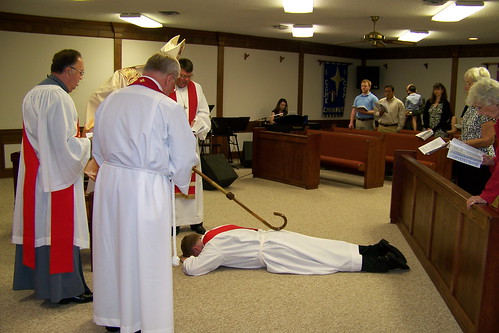
The Consecration of the Priest
All stand except the ordinand, who lies prostrate before the Bishop and the presbyters who stand to the right and left of the Bishop.
The hymn Veni Sancte Spiritus, is sung.
A period of silent prayer follows, the ordinand kneels before the bishop, the people still standing.
Bishop God and Father of all, we praise you for your infinite love in calling us to be a holy people in the kingdom of your Son Jesus our Lord, who is the image of your eternal and invisible glory, the firstborn among many brethren, and the head of the Church. We thank you that by his death he has overcome death, and, having ascended into heaven, has poured his gifts abundantly upon your people, making some apostles, some prophets, some evangelists, some pastors and teachers, to equip the saints for the work of ministry and the building up of his body.
The Bishop lays hands upon the head of the ordinand, the Priests who are present also laying on their hands.
Bishop Therefore, Father, through Jesus Christ your Son, give your Holy Spirit to Christopher; fill him with grace and power, and make him a priest in your Church. May he exalt you, O Lord, in the midst of your people; offer spiritual sacrifices acceptable to you; boldly proclaim the gospel of salvation; and rightly administer the sacraments of the New Covenant. Make him a faithful pastor, a patient teacher, and a wise councilor. Grant that in all things he may serve without reproach, so that your people may be strengthened and your Name glorified in all the world. All this we ask through Jesus Christ our Lord, who with you and the Holy Spirit lives and reigns, one God, for ever and ever.
People AMEN!
The new Priest is now vested according to the order of priests.
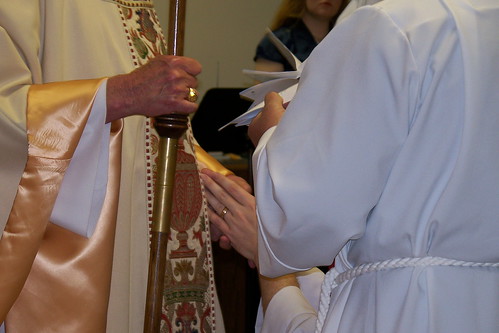 The new priest kneels before the Bishop for the anointing of his hands with Sacred Chrism, with the Bishop saying these words:
The new priest kneels before the Bishop for the anointing of his hands with Sacred Chrism, with the Bishop saying these words:
Bishop The Father anointed our Lord Jesus Christ through the power of the Holy Spirit. May Jesus preserve you to sanctify the Christian people and to offer sacrifice to God.
Priest Amen.
The Bishop anoints the hands of the new priest saying:
Bishop Grant, O Lord, to consecrate and sanctify these hands by this unction and by our blessing; that whatsoever they shall bless may be blessed and whatsoever they shall consecrate may be consecrated and sanctified; in the name of our Lord Jesus Christ. Amen.
Bishop then gives a Bible to the newly ordained, saying
Bishop Receive this Bible as a sign of the authority given you to preach the Word of God and to administer his holy Sacraments. Do not forget the trust committed to you as a priest of the Church of God.
The wife of the new priest is call forward and the bishop prays for the new priest and his wife.
Vows for Anglican Priesthood
Book of Common Prayer 1662 & 1928
DO you think in your heart, that you are truly called, according to the will of our Lord Jesus Christ, and according to the Canons of this Church, to the Order and Ministry of Priesthood?
Answer. I think it.
ARE you persuaded that the Holy Scriptures contain all Doctrine required as necessary for eternal salvation through faith in Jesus Christ? And are you determined, out of the said Scriptures to instruct the people committed to your charge; and to teach nothing, as necessary to eternal salvation, but that which you shall be persuaded may be concluded and proved by the Scripture?
Answer. I am so persuaded, and have so determined, by God's grace.
WILL you then give your faithful diligence always so to minister the Doctrine and Sacraments, and the Discipline of Christ, as the Lord hath commanded, and as this Church hath received the same, according to the Commandments of God; so that you may teach the people committed to your Cure and Charge with all diligence to keep and observe the same?
Answer. I will so do, by the help of the Lord.
WILL you be ready, with all faithful diligence, to banish and drive away from the Church all erroneous and strange doctrines contrary to God's Word; and to use both public and private monitions and exhortations, as well to the sick as to the whole, within your Cures, as need shall require, and occasion shall be given?
Answer. I will, the Lord being my helper.
WILL you be diligent in Prayers, and in reading the Holy Scriptures, and in such studies as help to the knowledge of the same, laying aside the study of the world and the flesh?
Answer. I will endeavour so to do, the Lord being my helper.
WILL you be diligent to frame and fashion your own selves, and your families, according to the Doctrine of Christ; and to make both yourselves and them, as much as in you lieth, wholesome examples and patterns to the flock of Christ?
Answer. I will apply myself thereto, the Lord being my helper.
WILL you maintain and set forwards, as much as lieth in you, quietness, peace, and love, among all Christian people, and especially among them that are or shall be committed to your charge?
Answer. I will so do, the Lord being my helper.
WILL you reverently obey your Ordinary, and other chief Ministers, unto whom is committed the charge and government over you; following with a glad mind and will their godly admonitions, and submitting yourselves to their godly judgments?
Answer. I will so do, the Lord being my helper.
Then, shall the Bishop, standing up, say,
ALMIGHTY God, who hath given you this will to do all these things; Grant also unto you strength and power to perform the same, that he may accomplish his work which he hath begun in you; through Jesus Christ our Lord. Amen..
Vows for Anglican Bishop
Book of Common Prayer 1662 & 1928
BROTHER, forasmuch as the Holy Scripture and the ancient Canons command, that we should not be hasty in laying on hands, and admitting any person to Government in the Church of Christ, which he hath purchased with no less price than the effusion of his own blood; before we admit you to this Administration, we will examine you in certain Articles, to the end that the Congregation present may have a trial, and bear witness, how you are minded to behave yourself in the Church of God.
ARE you persuaded that you are truly called to this Ministration, according to the will of our Lord Jesus Christ, and the order of this Church?
Answer. I am so persuaded.
ARE you persuaded that the Holy Scriptures contain all Doctrine required as necessary for eternal salvation through faith in Jesus Christ? And are you determined out of the same Holy Scriptures to instruct the people committed to your charge; and to teach or maintain nothing, as necessary to eternal salvation, but that which you shall be persuaded may be concluded and proved by the same?
Answer. I am so persuaded, and determined, by God's grace.
WILL you then faithfully exercise yourself in the Holy Scriptures, and call upon God by prayer for the true understanding of the same; so that you may be able by them to teach and exhort with wholesome Doctrine, and to withstand and convince the gainsayers?
Answer. I will so do, by the help of God.
ARE you ready, with all faithful diligence, to banish and drive away from the Church all erroneous and strange doctrine contrary to God's Word; and both privately and openly to call upon and encourage others to the same?
Answer. I am ready, the Lord being my helper.
WILL you deny all ungodliness and worldly lusts, and live soberly, righteously, and godly in this present world; that you may show yourself in all things an example of good works unto others, that the adversary may be ashamed, having nothing to say against you?
Answer. I will so do, the Lord being my helper.
WILL you maintain and set forward, as much as shall lie in you, quietness, love, and peace among all men; and such as be unquiet, disobedient, and criminous, within your Diocese, correct and punish, according to such authority as you have by God's Word, and as to you shall be committed by the Ordinance of this Realm?
Answer. I will so do, by the help of God.
WILL you be faithful in Ordaining, sending, or laying hands upon others?
Answer. I will so be, by the help of God.
WILL you shew yourself gentle, and be merciful for Christ's sake to poor and needy people, and to all strangers destitute of help?
Answer. I will so shew myself, by God's help.
ALMIGHTY God, our heavenly Father, who hath given you a good will to do all these things; Grant also unto you strength and power to perform the same; that, he accomplishing in you the good work which he hath begun, you may be found perfect and irreprehensible at the latter day; through Jesus Christ our Lord. Amen.
